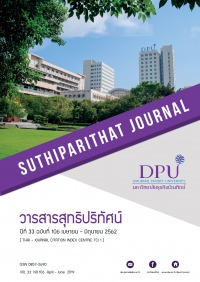ผลการดำเนินงานด้านสิ่งแวดล้อม สังคม และบรรษัทภิบาลกับคุณภาพกำไร
คำสำคัญ:
ผลการดำเนินงานด้านสิ่งแวดล้อม สังคม และบรรษัทภิบาล, คุณภาพกำไร, คุณภาพรายการคงค้าง, ข้อมูลกำไรที่มีประโยชน์ต่อการตัดสินใจ, การปรับงบการเงินย้อนหลังบทคัดย่อ
การพัฒนาอย่างยั่งยืนเป็นการสร้างความเป็นไปได้และสร้างโอกาสทางธุรกิจซึ่งเป็นสิ่งจำเป็นใน การดำเนินธุรกิจในปัจจุบัน โดยที่การปฏิบัติเกี่ยวกับความรับผิดชอบต่อสังคมเป็นหนึ่งในองค์ประกอบที่ สำคัญของการดำเนินงานด้านการพัฒนาอย่างยั่งยืนและในขณะเดียวกันก็สะท้อนถึงผลการดำเนินงาน ทางด้านการเงินด้วย งานวิจัยนี้จึงมีวัตถุประสงค์เพื่อวิเคราะห์ความสัมพันธ์ของผลการดำเนินงานด้าน สิ่งแวดล้อม สังคม และบรรษัทภิบาลที่มีอิทธิพลต่อคุณภาพกำไรของบริษัทจดทะเบียนในตลาดหลักทรัพย์ แห่งประเทศไทย วิธีที่ใช้วิเคราะห์ความสัมพันธ์ได้แก่ วิเคราะห์การถดถอยพหุคูณ และการวิเคราะห์ ความถดถอยโลจิสติค ผลการศึกษาพบว่า บริษัทที่มีผลการดำเนินด้านสิ่งแวดล้อม สังคม และ บรรษัทภิบาลที่ดีมีอิทธิทางบวกต่อคุณภาพรายการคงค้างของบริษัทจดทะเบียนในตลาดหลักทรัพย์แห่ง ประเทศไทยซึ่งแสดงว่าบริษัทที่มีความรับผิดชอบต่อสังคมจะรายงานกำไรที่มีคุณภาพ แต่อย่างไรก็ตามผล การศึกษากลับพบว่า บริษัทที่มีผลการดำเนินด้านสิ่งแวดล้อม สังคม และบรรษัทภิบาลที่ดีไม่มีอิทธิพลต่อ ข้อมูลกำไรที่มีประโยชน์ต่อการตัดสินใจ ซึ่งแสดงให้เห็นว่านักลงทุนในตลาดหลักทรัพย์แห่งประเทศไทย ไม่ได้นำข้อมูลเกี่ยวกับการดำเนินงานด้านสิ่งแวดล้อม สังคม และบรรษัทภิบาลมาใช้ประกอบการพิจารณา มูลค่าหลักทรัพย์
เอกสารอ้างอิง
อาณัติ ลีมัคเดช. (2556). การส่งสัญญาณด้วยรางวัลรับผิดชอบต่อสังคม: กรณีศึกษาของบริษัทจดทะเบียนในตลาดหลักทรัพย์แห่งประเทศไทย. วารสารบริหารธุรกิจ, 36(139), 27-42.
Bear, S., Rahman, N., & Post, C. (2010). The impact of board diversity and gender composition on corporate social responsibility and firm reputation. Journal of Business Ethics, 97(2), 207-221.
Choi, B. B., Lee, D., & Park, Y. (2013). Corporate social responsibility, corporate governance and earnings quality: Evidence from Korea. Corporate Governance: An International Review, 21(5), 447-467.
Dalton, D. R., Daily, C. M., Johnson, J. L., & Ellstrand, A. E. (1999). Number of directors and financial performance: A meta-analysis. Academy of Management journal, 42(6), 674-686.
Darrell, W., & Schwartz, B. N. (1997). Environmental disclosures and public policy pressure. Journal of accounting and Public Policy, 16(2), 125-154.
Dechow, P. M., Sloan, R. G., & Sweeney, A. P. (1995). Detecting earnings management. Accounting review, 70(2) 193-225.
Francis, J., & Schipper, K. (1999). Have financial statements lost their relevance?. Journal of accounting Research, 37(2) 319-352.
Francis, J., LaFond, R., Olsson, P. M., & Schipper, K. (2004). Costs of equity and earnings attributes. The accounting review, 79(4), 967-1010.
Frankel, R. M., Johnson, M. F., & Nelson, K. K. (2002). The relation between auditors’ fees for non audit services and earnings management. The accounting review, 77(s-1), 71-105.
Hong, Y., & Andersen, M. L. (2011). The relationship between corporate social responsibility and earnings management: An exploratory study. Journal of Business Ethics, 104(4), 461-471.
Huang, H. W., Rose-Green, E., & Lee, C. C. (2012). CEO age and financial reporting quality. Accounting Horizons, 26(4), 725-740.
Jensen, M. C., & Meckling, W. H. (1976). Theory of the firm: Managerial behavior, agency costs and ownership structure. Journal of financial economics, 3(4), 305-360.
Kim, Y., Park, M. S., & Wier, B. (2012). Is earnings quality associated with corporate social responsibility?. The Accounting Review, 87(3), 761-796.
Lewicka-Starzałecka, A. (2006). Odpowiedzialność moralna w życiu gospodarczym. IFiSPAN. Warszawa: Wydawnictwo.
Madhani, P. M (2007). Corporate governance from compliance to competitive advantage. The Accounting World, 7(8), 26-31.
Makower, J. (2009). Strategies for the green economy opportunities and challenges in the new world of business. New York: McGraw-Hill.
Martínez-Ferrero, J., Banerjee, S., & García-Sánchez, I. M. (2016). Corporate social responsibility as a strategic shield against costs of earnings management practices. Journal of Business Ethics, 133(2), 305-324.
Martínez-Ferrero, J., Garcia-Sanchez, I. M., & Cuadrado-Ballesteros, B. (2015). Effect of financial reporting quality on sustainability information disclosure. Corporate Social Responsibility and Environmental Management, 22(1), 45-64.
Muttakin, M. B., Khan, A., & Azim, M. I. (2015). Corporate social responsibility disclosures and earnings quality: Are they a reflection of managers’ opportunistic behavior?. Managerial Auditing Journal, 30(3), 277-298.
Muttakin, M. B., Khan, A., & Subramaniam, N. (2015). Firm characteristics, board diversity and corporate social responsibility: Evidence from Bangladesh. Pacific Accounting Review, 27(3), 353-372.
Porter, M., & Kramer, M. (2011). Creating shared value. Harvard Business Review, January/February, 62-77.
Simmons, J. (2004). Managing in the post-managerialist era: Towards socially responsible corporate governance. Management Decision, 42(3/4), 601-611.
Stawicka, E. (2017). Sustainable development and the business context of CSR benefits on the polish market. Acta Scientiarum Polonorum. Oeconomia, 16(3), 73-81.
Suchman, M. C. (1995). Managing legitimacy: Strategic and institutional approaches. Academy of Management Review, 20(3), 571-610.
Waddock, S. A., & Graves, S. B. (1997). The corporate social performance-financial performance link. Strategic Management Journal,18(4) 303-319.
Waldman, D. A., De Luque, M. S., Washburn, N., House, R. J., Adetoun, B., Barrasa, A., ... & Dorfman, P. (2006). Cultural and leadership predictors of corporate social responsibility values of top management: A GLOBE study of 15 countries. Journal of International Business Studies, 37(6), 823-837.
Yip, E., Van Staden, C., & Cahan, S. (2011). Corporate social responsibility reporting and earnings management: The role of political costs. Australasian Accounting Business & Finance Journal, 5(3), 17.
ดาวน์โหลด
เผยแพร่แล้ว
รูปแบบการอ้างอิง
ฉบับ
ประเภทบทความ
สัญญาอนุญาต
เนื้อหาและข้อมูลในบทความที่ลงตีพิมพ์ในวารสารสุทธิปริทัศน์ ถือเป็นข้อคิดเห็นและความรับผิดชอบของผู้เขียนบทความโดยตรงซึ่งกองบรรณาธิการวารสาร ไม่จำเป็นต้องเห็นด้วย หรือร่วมรับผิดชอบใด ๆ
บทความ ข้อมูล เนื้อหา รูปภาพ ฯลฯ ที่ได้รับการตีพิมพ์ในวารสารสุทธิปริทัศน์ ถือเป็นลิขสิทธิ์ของวารสารสุทธิปริทัศน์หากบุคคลหรือหน่วยงานใดต้องการนำทั้งหมดหรือส่วนหนึ่งส่วนใดไปเผยแพร่ต่อหรือเพื่อกระทำการใด ๆ จะต้องได้รับอนุญาตเป็นลายลักษณ์อักษรจากวารสารสุทธิปริทัศน์ก่อนเท่านั้น







